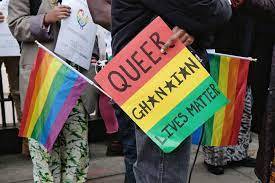LGBTQ+ individuals in Ghana face discrimination, violence, and social ostracism despite homosexuality not being illegal. The government and religious leaders have taken a strong stance against LGBTQ+ rights, with 96% of Ghanaians saying that homosexuality should not be accepted by society. However, activists and allies are working to challenge discrimination and advocate for the rights of LGBTQ+ people, giving hope for progress in the fight for equality.
Ghana, like many other African countries, has a complex and often difficult relationship with the LGBTQ+ community. Despite homosexuality not being illegal in Ghana, the country has a long history of discrimination and harassment against LGBTQ+ people, with many facing violence and social ostracism.
The situation for the LGBTQ+ community in Ghana has become even more challenging in recent years, with increased hostility from religious leaders, government officials, and some members of the public. In February 2021, a group of activists opened the country's first LGBTQ+ community center in Accra, the capital city, but the center was quickly shut down after protests and threats from conservative groups.
The Ghanaian government has also taken a strong stance against LGBTQ+ rights, with several high-profile politicians and religious leaders openly condemning homosexuality. In 2019, the country's Minister for Gender, Children, and Social Protection, Cynthia Morrison, publicly stated that the government would not legalize same-sex marriage in Ghana, and that homosexuality is "unnatural" and "un-African."
This kind of rhetoric has emboldened anti-LGBTQ+ sentiment in the country, with many people using religion and tradition as justification for discrimination against LGBTQ+ people. In a survey conducted by the Pew Research Center in 2013, 96% of Ghanaians said that homosexuality should not be accepted by society.
This deep-seated prejudice has real-world consequences for LGBTQ+ people in Ghana. Many face violence, discrimination, and abuse, both from individuals and institutions. In 2018, for example, an LGBTQ+ group in Ghana reported that it had been forced to close after threats of violence and arrests from the police.
Despite these challenges, however, there are also signs of progress and hope for the LGBTQ+ community in Ghana. A growing number of activists and allies are working to challenge discrimination and advocate for the rights of LGBTQ+ people, both within Ghana and on the international stage.
In 2018, for example, a group of LGBTQ+ activists in Ghana filed a lawsuit challenging the country's laws criminalizing homosexuality. The case is ongoing, but it represents a significant step forward in the fight for LGBTQ+ rights in the country.
There are also a number of organizations and initiatives working to support and empower LGBTQ+ people in Ghana. These include groups like LGBT+ Rights Ghana, which provides advocacy, education, and support for the community, and Rainbow Radio, an online platform that provides information and resources for LGBTQ+ Ghanaians.
Currently, there is legislation in Ghana's Parliament to promote "proper human sexual rights and Ghanaian family values". President Nana Akufo-Addo has stated publicly that gay marriage will never be permitted while he is in office, and the bill that is currently being discussed in parliament is backed by a large portion of the populace.
If the bill is approved by the parliament, the president will have the option of signing it despite opposition or exercising his veto, which analysts and diplomats believe he may be reluctant to exercise given the strong public support for anti-LGBT legislation.
Ultimately, the situation for LGBTQ+ people in Ghana remains complex and challenging, but there are also reasons to be hopeful. As more people in Ghana and around the world recognize the human rights of LGBTQ+ people, and as more individuals and organizations work to challenge discrimination and promote acceptance, there is hope that the situation for LGBTQ+ people in Ghana will continue to improve.




No comments yet
Be the first to share your thoughts!